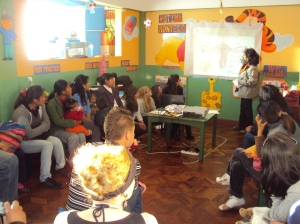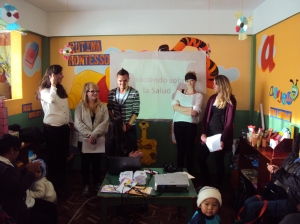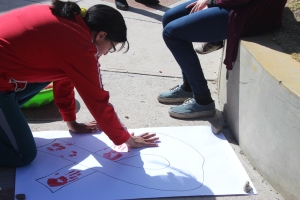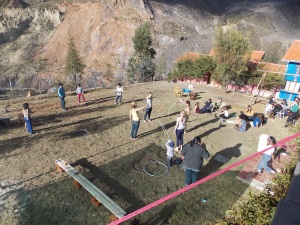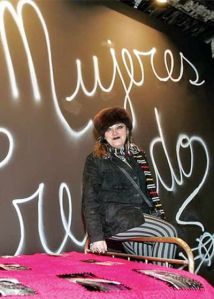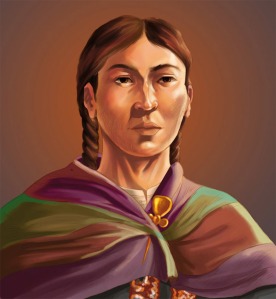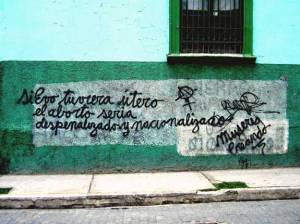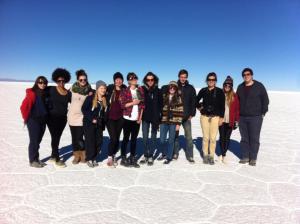Charlotte’s Final UpClose Project Reflections
On Saturday 15th June 2013, UpClose Bolivia had a final event to celebrate and give thanks to the community and those who we’ve worked with over the past 3 months. Over our time here, we have worked with a wonderful variety of different people and it was important for us to acknowledge how they’ve all played a huge part in our lives.
The day started off with excitement buzzing in the house as we set up for the occasion. Sorting out the different stalls to be dotted around the garden like an English summer fete, bobbing apples, face painting, hula-hooping and skipping competitions as well as egg and spoon races and the flour game (having to find sweets in a pile of flour using only your mouth).
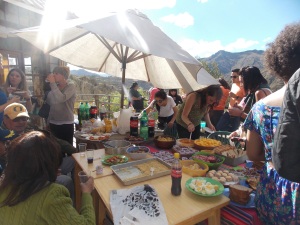
At 2:30pm, neighbours and colleagues started to arrive and the apthapi started to grow with cakes, pastries, sandwiches, fruit and so on. Most of the parents and adults stayed round the table conversing while the children played down the lower end of the garden where the games were. They all wanted their face painted; Laura and Sophie (UpClose Bolivia volunteers) did an amazing job at transforming the children into butterflies, super heroes, flowers and birds. Shortly into the event, other International Service volunteers arrived to join in the fun. The hula hoop competitions started as did the apple bobbing, soaking everyone who partook!
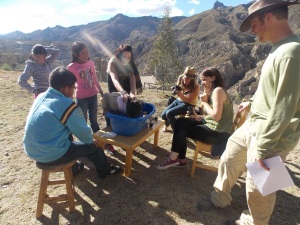
The whole day was so much fun and it was lovely to see the people we work with in a social environment. We will truly miss everyone that we have met in Bolivia and we will be sad to leave this beautiful country. Thank you to everyone who come and had fun with us on Saturday and for making our time here so special.
Written by: Charlotte Cusdin
Edited by: Liam Hilton
Dina’s ChildFund Project Reflections
As we approach the end of our three months volunteering here in Bolivia, it’s time to reflect on the impact our work has had on the communities with whom we’ve been working. Has our presence in La Paz made a difference in the lives of the locals here and contributed to the country’s development? As volunteers under the International Citizen Service scheme, we hope to develop ourselves as “global citizens” whilst making a positive contribution to various disadvantaged communities in developing nations around the world. The bigger aim is to work towards achieving the UN Millennium Development Goals by their 2015 deadline.
As 21 volunteers here in La Paz, our work is incredibly diverse. From teaching mothers about sexual health and offering discounted smear testing to building a greenhouse in the city of El Alto and educating the local communities about diet and nutrition; we are involved in many different areas. Our aim is to make our presence positively felt by a diversity of people in a variety of parts in need of being addressed. Prior to our arrival in La Paz, we had little idea about the specific details of our work making it all the more challenging once we got started. I think it’s safe to say that, as a group, we have put our all into our projects and have tried to take advantage of every opportunity to make a difference and a lasting, sustainable impact. Volunteers in El Alto, for instance, have sought to set up an on-going clothes recycling scheme to encourage volunteers and charity staff to donate any unwanted clothing to the communities here. Others, in various children centres and down in the district of Mallasa, have been working hard designing and painting murals and there’s even a garden being landscaped by a volunteer in one of our newest centres. It seems that, as we shortly prepare to leave La Paz, we will be able to say that we have made some difference here in Bolivia.
Personally, I have been working with adolescents and young people in a youth centre in Miraflores in association with the international charity ChildFund. My class is made up of a diversity of young people, mainly girls, between the ages of 12 and 17 who attend the centre when they’re not at school. I have been organising a range of interactive activities to teach the class about important themes and values, themes which are unlikely to be covered by their everyday curriculum at school but which are nonetheless vital to learn about.
I started out by running a class on self-esteem and confidence which was fortunately very well received by the students. It was my first chance to get an insight into the minds of the students and their thoughts on important issues such as prejudice and discrimination. Fortunately, contributions to the class discussion weren’t lacking and it was fantastic to receive feedback and opinions from so many of the students. I presented a video in which an office worker has a deformed face and is teased because of his appearance. After watching this, the class completed a worksheet which I had prepared and we went on to discuss their responses. The students were very receptive to the message of the video and even contributed their own personal stories on discrimination and bullying. I was very pleasantly surprised with their honesty and I think the activity helped to bring them a little closer as a class.
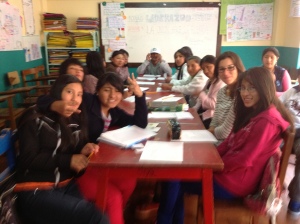
Dina Fahmy working with the students in her class
Next, I wanted to teach the class about the importance of a healthy diet and which foods offer the best nutrition. In order to make things a little more interactive and entertaining, we spent the first part preparing a fruit salad! This proved to be a great way to teach the students about the nutritional content of different fruits and vegetables. Ideally, the students will share what they’ve learnt with their friends and families and will use the nutrition worksheets I provided them with for future reference. It was a fantastic surprise when I returned to the centre the following week and found some of the girls snacking on apples instead of their usual lollipops and sweets before class.
We have also covered themes such as relationships, decision-making and leadership; with every class I have gotten closer with the students and learnt more about them and their interests. It is really promising to see that they’re an optimistic lot and have bold dreams and goals for the future. During my time working at the centres, I have tried to instil as much confidence in the students as possible, encouraging them to aim high. While the class is mixed, it is mainly girls and it is brilliant to see such strong, confident girls in action here in Bolivia, which statistically does not boast the best gender equality. Amongst the students are girls who want to become engineers, nurses, chefs, girls who want to go into higher education, girls who want to see the world – they are not discouraged from expressing their opinions and from dreaming big, and I really hope that they are able to make their dreams a reality.
In addition to my work in the centres, I have been working with the rest of the ChildFund volunteers in contributing to the development of a curriculum. Work on this curriculum began with previous cohorts of ICS volunteers and we arrived in La Paz in time to work on the final stages of its production. Education here in Bolivia lacks any established framework for teaching young people about sexual and reproductive health, or anything which could be seen as an equivalent to other national sexual education courses such as the compulsory Physical and Sexual Health Education syllabus we have in England. This could be down to a multitude of reasons in this developing nation, but taking an “out of sight, out of mind” approach is clearly proving ineffective as we see the teenage pregnancy rates are higher than in many of Bolivia’s neighbouring countries.
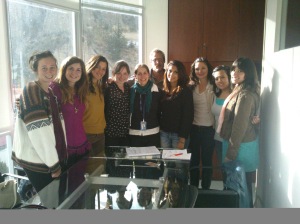
ChildFund team handing their Sexual Reproductive Health curriculum to Ana Vacas, ChildFund Youth Director
Thus, the curriculum is not intended as an academic curriculum but as a means of educating children, adolescents and youth about the body, relationships, sexual health and responsible decision-making. Initially, the curriculum is to be used in centres around La Paz and ultimately it is hoped that it will be branched out nationally. It is exciting to see how this curriculum will progress and how well it will be received here in Bolivia, where the topic of sex remains a sensitive one. However, it is still early days as we have just recently made the handover to Ana Vacas, the ChildFund youth director. Judging from her reaction though, things seem highly promising!
It hasn’t all been plain sailing here in La Paz; we’ve faced our fair share of obstacles. From irregular schedules and cancelled classes to Salmonella and E-coli; we’ve experienced it all. But we’ve pulled through and managed to keep our spirits high without losing sight of why we’re here. As we get ready to descend from the highest capital in the world, I can safely say that it has been an experience of a lifetime. Alongside working on our projects, we have been exposed to some of the world’s most beautiful landscapes and have shared some incredible experiences from touring Salar de Uyuni and the gorgeous lagunas, to joining the locals in the fiestas of Copacabana and La Paz’s Gran Poder. This experience has taught me a great deal about international development and has contributed to making me a more global citizen. Leaving Bolivia, I hope that our presence has had a positive influence on the communities here and that the ICS scheme continues to assist in development, working with Bolivians in making the most of the rich potential this unique country has to offer.
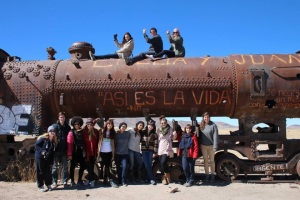
The volunteers exploring the unique train cemetery on the Salar de Uyuni tour
Written by: Dina Fahmy
Edited by: Liam Hilton
India’s Reflections on the Aldeas SOS Entrepreneurship Project
I have spent three months volunteering with International Service’s “Greenhouse Project” in La Paz. Our project is centered around two important goals – empowerment and the raising of nutritional standards in El Alto.
We focus on empowerment because more than 70 per cent of El Alto’s families live in poverty. Enabling these families to better their lives is of paramount importance. The project also recognises that if it is to empower the most maligned sectors of Bolivian society, it must help women first and foremost.
Greenhouses can empower by giving individuals and families economic independence. When vegetables finally bloom they can be sold, they can provide a sole or a supplementary income for anyone who may need it. But this can be especially empowering for women.
As part of our role on the project, we spend one day a week helping to build greenhouses in El Alto. On one particular week, we were sent to help a woman who had recently lost her husband and had been left with four children to support. As you can imagine, we felt very motivated to support this family.
The family live on a small plot in a barren area of El Alto. Their house consists of only one room, but a greenhouse sits proudly to the side of it, constructed with bricks and plastic sheeting. Inside grow vegetables to improve the nutrition of the four children and to improve their economic standing.
We were tasked with creating bricks to rebuild her greenhouse. We spent the morning sorting through sand, taking out any large rocks and ensuring it was suitable to create bricks. The sand was then mixed with water and hay by members of the community and ourselves. It was left to dry, and then placed into moulds. Even after all this, we couldn’t quite believe it when we saw real bricks lying on the sandy ground.
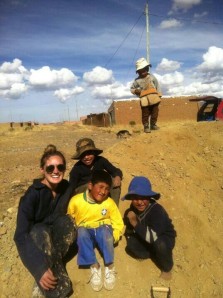
Siobhan Cunningham with local children making bricks for the greenhouse
The Mother of the family was very much a part of the work and a part of changing her own future. That day we felt as if we had made a genuine impact on the family’s life, and it certainly felt like empowerment.
Nutrition is important as arguably one of the biggest issues facing Bolivian society. A third of children are malnourished today in Bolivia and the rate of malnutrition for children in the poorest households – where we are working – is as high as 40 percent. This is most important for Bolivia’s children as when a child does not receive enough nutrition before the age of 2, this affects not only the development of the body but of the brain.
We are helping the community around the Portada Triangular children’s centre to build a greenhouse. This is a part of our work more focused on nutrition, because of the example this can set to the children. Arguably, the community will only use the greenhouse to its full potential if they have a real stake in it, so it is they who are taking responsibility for building it.
We are also spending one morning a week in the children’s centre next to the steadily rising greenhouse. We have been closely observing the food eaten at the centres and have implemented activities based around nutrition with the children.
Our team has also been carrying out some small-scale research to find out more about the diet of those in our two work areas in El Alto. We recently held a research workshop in Portada Triangular. We had observed that, when faced with formal questionnaires, individuals might exaggerate their healthy-eating habits or simply get bored of answering the questions. So, we created fun activities in which information could be revealed without any pressure.
We led an activity in which the parents were asked to place pictures of food on a scale of “good” to “bad” health. These items included Bolivian staples like chicken, corn, potatoes and coca tea. Another task for the group was to draw around one participant on a large piece of paper. They then drew a heart, muscles, eyes and other important areas of the body and wrote next to them what foods they believed to be beneficial to those areas specifically. The volunteers were interested to learn it is apparently a Bolivian tradition to feed your child grapes should they have trouble speaking.
There were two final tasks to gain an understanding of how the parents cook and shop for food. The first task asked two groups to imagine shopping for a family of 4 with 100 Bolivianos. We asked the groups to prioritise food and were wondering whether vegetables, meat or eggs would be cut. The second listed around eight food items and asked whether they mostly ate them fried, boiled, baked or raw.
We finished the workshop by serving up food that we had cooked with nutrition in mind. This included a sweet potato and spinach bake a quinoa salad and a courgette frittata. The food was received better than we had expected and the parents even asked for the recipes.
Our final efforts before leaving this beautiful country will be to use the knowledge gained from our research for two educational workshops. One in Portada Triangular and one in El Alto. We will also be producing educational leaflets for both communities with the hope that these too could have a positive effect.

The Entrepreneurship team in El Alto
We sincerely hope that our “Greenhouse Project” has had a positive consequence on those in La Paz. We have certainly enjoyed our project and met some amazing people, such as the strong woman in El Alto and the enthusiastic parents in Portada Triangular. If we have had even half the impact that Bolivian people have had on us then we will leave Bolivia fulfilled.
Written by India Thorogood
Edited by Liam Hilton

